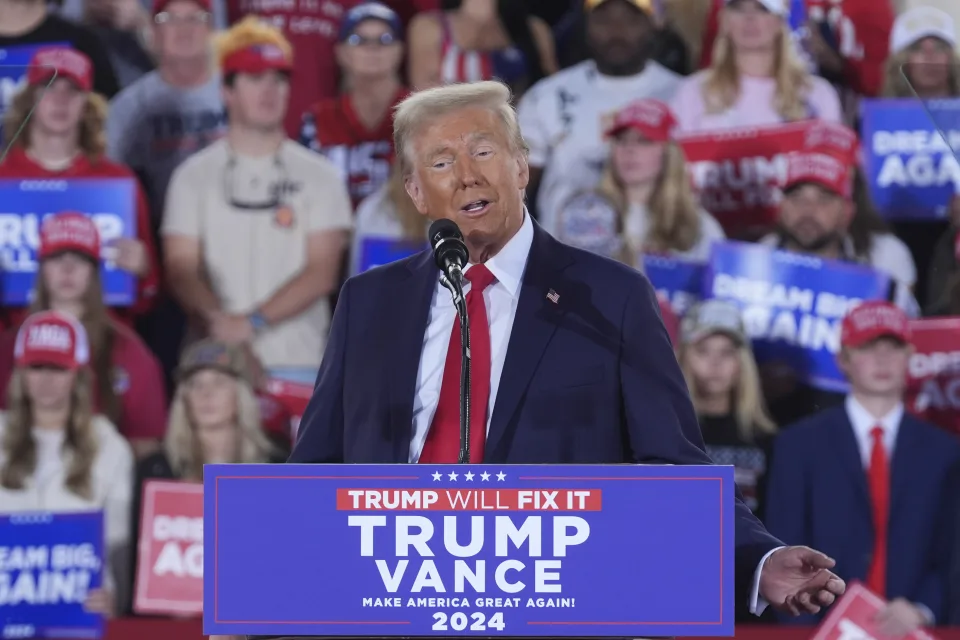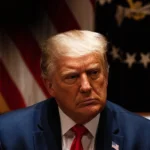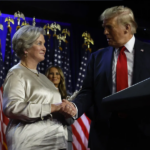In a surprising twist, Donald Trump and his allies have introduced a series of last-minute economic promises as the 2024 presidential race enters its final stretch. From escalating tariffs on Mexico to proposed cuts in semiconductor funding and renewed discussions on healthcare reform, these pledges mark a departure from traditional campaign strategy, which typically avoids new policy rollouts so close to Election Day.
A Surge in Tariff Promises on Mexico and Beyond
On the last day of his campaign, Trump announced a new policy that could reshape U.S.-Mexico trade relations. Speaking in Raleigh, N.C., he pledged to impose a 25% tariff on Mexican goods, potentially rising to 100%, as a measure to address drug and crime concerns along the border. “If they don’t stop this onslaught of criminals and drugs coming into our country, I’m going to immediately impose a 25% tariff,” Trump said, escalating his campaign’s existing tariff proposals.
This commitment follows previous promises to apply 60% tariffs on Chinese imports, 10-20% duties on goods from other trading partners, and 200% on automobiles from Mexico. Trump’s proposal has sparked concerns among economists, including Brendan Duke, who estimates that this latest tariff plan could cost a typical American family up to $5,700 per year, a marked increase from his previous $3,900 projection. Duke and other experts warn that increased tariffs would likely result in higher consumer prices and disrupt key industries.
Debates on Semiconductor Funding and Healthcare Reform
Trump’s campaign rhetoric has also shifted to critique the Biden administration’s semiconductor funding initiatives, specifically the CHIPS and Science Act of 2022, which allocated $50 billion to the semiconductor industry and has spurred over $400 billion in private investments. Last month, Trump expressed skepticism about the program during a podcast with Joe Rogan, calling the CHIPS Act “so bad” and suggesting that tariffs would be a more effective approach to boosting domestic manufacturing.
House Speaker Mike Johnson recently echoed these concerns, stating he would consider reforming or potentially repealing the CHIPS Act, a stance that drew swift reactions from lawmakers in states benefiting from chip-related investments. Johnson has since clarified, emphasizing a focus on reform rather than a full repeal.
On healthcare, Trump’s comments have hinted at a renewed push to repeal the Affordable Care Act, also known as Obamacare. Johnson added fuel to the debate when a video surfaced of him advocating for “No Obamacare” and suggesting significant reforms. He later clarified his statement, but the mention has given Democrats ammunition in swing states where healthcare is a key concern.
Implications for the 2024 Election Outcome
With the election in a tight race, Trump’s unexpected policy promises are raising questions about their impact on voters. Economists worry that Trump’s proposed actions could stoke inflation and introduce volatility into critical economic sectors. Yet, Trump’s track record of following through on tariffs suggests that these proposals may appeal to voters who support an aggressive approach to trade and industry.
The question remains whether these final policy declarations will resonate with undecided voters or complicate Trump’s standing in the close race. As Trump’s bold economic promises continue to make headlines, both his supporters and critics await the outcome of what has become a pivotal final push in the 2024 election.





